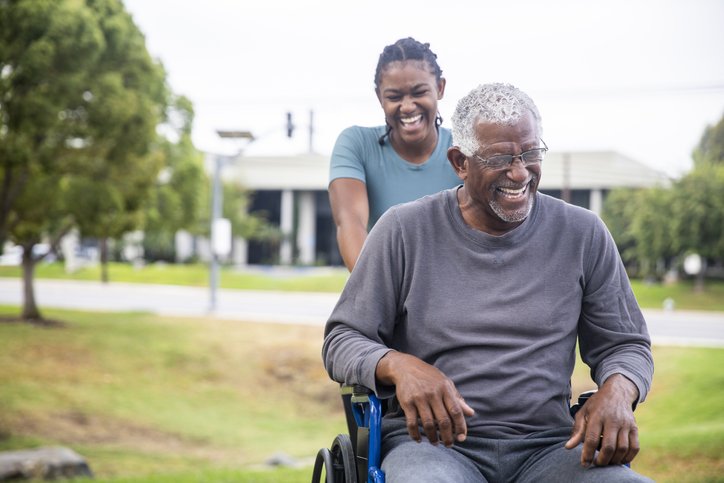Taking Care of You: Helpful Resources for Caregivers
Few people plan to be caregivers for their loved ones. It’s a role that often comes on suddenly following an emergency or evolves over time as a result of an ongoing medical condition. In either case, it becomes necessary to assist your loved with their care and daily activities. If you feel unprepared or overwhelmed in your caregiving role, you’re not alone.

The transition involves time and effort, and over the long-term, it can be taxing. Whether you’re new to caregiving and have endless questions, or are a seasoned veteran who’s feeling the strain, know that help is available. Check out these useful sites, chock full of valuable resources for all stages of the caregiving spectrum:
- AARP’s Family Caregiving: Here you’ll find an array of information, tools and resources to help you in your journey of caring for a loved one. Experts provide information via blogs, webinars and one-on-one interaction through social media channels. The site’s supportive online community can help you connect with others who are experiencing similar caregiving challenges. To top it off, you don’t even have to be an AARP member to access this valuable information.
- Benefits Checkup: Navigating the system of caregiving benefits is challenging, and many people miss out on aid simply because they don’t know it exists. The Benefits Checkup site makes it easy to quickly see what benefits are available in your area that you or your loved one are likely to qualify for.
- Family Care Navigator: The caregiver support resources available vary based on your geographic location. The Family Care Navigator helps you hone in on specific programs and organizations that are available in your state and local community.
- Lotsa Helping Hands: This site connects volunteers with caregivers in their area who need some extra help. Caregivers can request help via the website’s calendar and available volunteers step in to provide assistance with tasks like meal delivery or rides to appointments.
- National Long-Term Care Clearinghouse: At some point, you may no longer be able to provide the level of care your loved one needs. This repository run of information by the U.S. Administration on Aging answers a multitude of questions about the nature of long term care, who needs it, how much it costs in each state, payment options, and details about Medicare and Medicaid coverage.
If caregiver stress is getting the best of you, you’re in good company. According the National Alliance for Caregiving/AARP’s "Caregiving in the United States 2017" report, nearly half of all family caregivers say they’re “somewhat stressed” and more than a third are “highly stressed”. If you’re among them, reaching out for supportive resources like the ones we’ve outline above is a great way to start. Here are some additional tips that will help you reduce your stress levels avoid caregiver burnout.
- Take a break. Everyone needs some time off—even caregivers. Ask a relative, friend or neighbor to take over for a few hours every so often so that you can catch a movie or go out to dinner. You might even consider forming a network or respite co-op with other caregiving families so that you can help each other out from time to time. The Eldercare Locator, sponsored by the U.S. Administration on Aging, is great free resource that provides area-specific recommendations for services such as home care, adult day care and transportation.
- Consider joining a support group. Support groups can provide a wide range of benefits for family caregivers. By interacting with others who are in a similar situation as yours, it provides a sense of community and reduces feelings of isolation. These groups can offer information, helpful suggestions, and emotional support through the good times and the bad. Joining a group may also help you learn more about your loved one’s disability or illness, new treatments available, and legal or financial tips involving his or her care.
- Nurture the positive relationships in your life. You may be overwhelmed, but it’s important to spend time with those you’re closest to. An evening with a loving spouse or lunch with a cherished friend can do wonders for your attitude and outlook. Try to limit your interactions with negative people who will drag down your mood and perspective.
- Practice self-care. When you’re caught up in caring for others, it can be easy to neglect your own health. Establish a good sleep routine and allocate time to exercise every week. Be sure to eat healthy foods like vegetables, fruits, and lean meats, and drink plenty of water. Tell your physician that you’re a caregiver and let him or her know about any concerns you may have. Many people find that daily relaxation practices, such as guided meditation, yoga, and deep breathing, are also beneficial.
Caring for a loved one puts a strain on even the most resilient people. If you're a caregiver, it’s essential that you take steps to preserve your own health and well-being. If you need more information about caregiving resources, our compassionate funeral directors are always here to assist you. Please reach out to us anytime.
About Batchelor Brothers Funeral Services: As a leading African American-owned and operated funeral and cremation organization serving three states, Batchelor Brothers Funeral Services has provided a ministry of care to thousands of grieving families. We promise to provide our highest level of distinguished service and respect to families who entrust us to honor their loved one. In all aspects of the funeral process, we strive to be the absolute best and are honored to help preserve our clients’ legacies for future generations. With three convenient locations serving both North and West Philadelphia, as well as Trenton and Drexel Hill, it is always our pleasure to be of service. Please visit our website for more information.






Comments